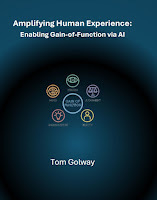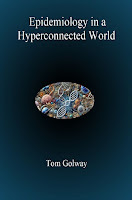Tom Golway's Blog
November 3, 2025
Composing Reality: Rovelli’s Relational Physics and the Case for Open Science
Carlo Rovelli’s relational view of reality isn’t just aradical physics insight—it’s a governance imperative for AI and science. Icouldn’t agree more.
Rovelli’s latest interview in Quanta Magazine is amasterclass in epistemic humility. His relational interpretation of quantummechanics—where reality is not a fixed inventory of things but a web ofinteractions—offers a profound challenge to legacy models of objectivity andcontrol. This isn’t just theoretical physics; it’s a philosophical s...
October 22, 2025
Amplifying Human Experience: Enabling Gain-of-Function via AI
 Artificial Intelligence is too often mythologically known as an all-knowing oracle, human replacement, or rival species.” This framing reflects a pantheistic fallacy—the belief that more data equals perfect knowledge. It assumes that scale alone can substitute for understanding, and that exposure to vast corpora confers expertise. But AI’s true power lies not in autonomy, but in augmentation. It is not a rival mind—it is a cognitive scaƯold, a tool for amplifying human judgment, not repla...
Artificial Intelligence is too often mythologically known as an all-knowing oracle, human replacement, or rival species.” This framing reflects a pantheistic fallacy—the belief that more data equals perfect knowledge. It assumes that scale alone can substitute for understanding, and that exposure to vast corpora confers expertise. But AI’s true power lies not in autonomy, but in augmentation. It is not a rival mind—it is a cognitive scaƯold, a tool for amplifying human judgment, not repla...
The Problems of Philosophy in the Age of AI
When Bertrand Russell wrote The Problems of Philosophy in 1912, he grappled with the gap between appearance and reality, asking how we can know anything with certainty when our senses may deceive us. Russell’s skepticism presumed that underlying truth existed and could be approached through rigorous inquiry. Over a century later, his questions have not merely persisted—they have proliferated into new domains of epistemic risk. Artificial intelligence does not simply introduce fresh uncer...
June 3, 2025
Emerging Dynamics: The Hyperconnected Forces Hacking Life
The world is accelerating—not with the predictable momentum of linear progress, nor the steady compounding of geometric growth, but in an exponential surge where every advancement feeds into the next, amplifying disruption at an unprecedented scale. Science, technology, society, ethics, government, and economics are no longer separate forces evolving at their own pace; they have become hyperconnected, each fueling the velocity of change in a relentless loop of innovation, adaptati...
April 20, 2025
Epidemiology in a Hyperconnected World

Epidemiology in a Hyperconnected World explores the evolving field of epidemiology in the digital age. The book emphasizes systems thinking, integrating biological, technological, and social factors to understand disease spread. Key themes include the crucial role of advanced modeling techniques (like those informed by chaos theory) and precision medicine, along with the transformative potential of open scienc...
April 18, 2025
AI's Pantheistic Fallacy
“The pantheistic fallacy assumes that more data equals perfect knowledge, but AI is constrained by the blind spots in its information, leading to flawed decisions in the real world.”
AI systems often operate under the assumption that the more data they process, the better their decision-making capabilities will become. This belief, which I call the "pantheistic fallacy," rests on the notion that AI has access to all the necessary information t...
July 19, 2024
AI Governance: Creative Destruction without Pervasive Disruption
May 20, 2023
Unleashing Reliable Insights from Generative AI by Disentangling Language Fluency and Knowledge Acquisition
This deficiency can lead to mistakenly associating correlation with causation, reliance on incomplete or inaccurate data, and a lack of awareness regarding sensitive dependencies between information sets. With society’s increasing fascination with and dependence on Generative AI...
February 13, 2023
Solar Geoengineering – The Risks of Hacking our Climate
As humans, we think of ourselves as a single organism...



